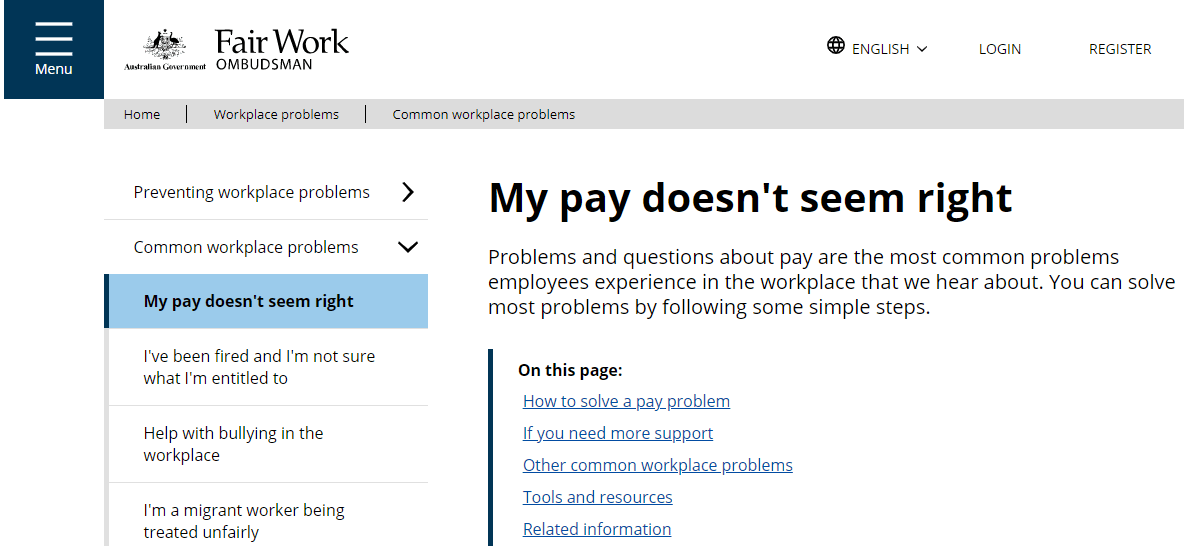
An Angry Parliament
Whilst we cannot fix the past, we can change the future by delivering efficient automation of the Payroll from the approved Timesheets.
In fact, with our automation in Rostering with Timekeeping flow to the Timesheets for management authorisation and employee acceptance via their device, it can be so simple.
Adding the Inzenius Employee portal communications and interfaces streamlines the entire process from Onboarding to Payroll saving time and cost with improved accuracy and compliance.
What can it mean to be investigated for underpayment of wages?
Wage theft financial penalties, in severe cases, can lead to the imprisonment of Managers and Directors.
The definition of Wage Theft offences is documented to involve deliberate and dishonest conduct. Honest mistakes made by employers who exercise due diligence in paying wages and entitlements are not considered wage theft.
In Victoria, these crimes are punishable by a fine of up to $218,088 or up to 10 years in jail for individuals and a fine of up to $1,090,440 for companies.
Wage Inspectorate Victoria (the Inspectorate) has laid Australia’s first criminal wage theft charges under the Wage Theft Act 2020 (Vic) (Act). The Act, which has been in operation in Victoria since 1 July 2021, imposes several wage theft offences on Victorian employers and their officers.
The Victorian Legislation
On 16 June 2020, the Victorian Parliament passed the Wage Theft Bill 2020. For the first time, this meant that there would be criminal penalties, including jail time for employers, when they underpay their staff. The Bill came into effect on 1 July 2021.
Section 6 of the Act made it unlawful for employers in Victoria to underpay employees or withhold their entitlements dishonestly. An underpayment or withholding of entitlements will not be considered dishonest for this section if due diligence is exercised to pay and attribute entitlements to employees. Furthermore, the Act empowers the Inspectorate to investigate and commence proceedings into possible employee entitlement offences.
How and whom the Inspectorate focuses on should be of interest to Victorian employers now covered by federal workplace legislation, which imposes civil penalties, and Victorian legislation,n which imposes criminal penalties, for the same conduct.
Victorian employers must understand their obligations to proactively manage compliance with their employment obligation,s including federal awards and enterprise agreements.
The Bill creates criminal offences for employers acting dishonestly relating to:
- Underpaying employee entitlements; and
- Not actively listening and responding to queries from their employees about their pay and entitlements.
- malpractice regarding record keeping.

Employers should conduct due diligence to ensure compliance which may include:
- Ensure your business record keeping is relevant to the requirements.
- Being aware of changes to minimum pay and entitlements (including changes to instruments such as modern awards) and updating payroll systems;
- Regularly reviewing and auditing payroll compliance;
- Actively listening and responding to queries from their employees about their pay and entitlements;
- Maintaining clear decision-making lines to determine who is responsible for authorising payments and entitlements; and
The Unions are vested in identifying and encouraging employees to join their union and check their pay and super payments. They found that it had been published that two-thirds of workers in Australia need to receive their full salary.

With the changes in industry-wide enforcement of like business award rules, the unions will significantly influence many more workplaces. Therefore, they want their members to follow these steps to determine if they are underpaid.
Fair Work also has an interest in instigating investigations of underpayments.

Australia’s First Criminal Wage Theft Charges
Wage Inspectorate Victoria (the Inspectorate) has laid Australia’s first criminal wage theft charges under the Wage Theft Act 2020 (Vic) (Act).
On 29 November 2022, the Inspectorate announced it had filed 94 criminal charges in the Magistrates’ Court of Victoria against a Macedon restaurant and its officer.
Victorian Legislative context
Section 6 of the Act makes it unlawful for employers in Victoria to underpay employees or withhold their entitlements dishonestly. An underpayment or withholding of entitlements will not be considered dishonest for this section if due diligence is exercised to pay and attribute entitlements to employees.
The Act empowers the Inspectorate to investigate and commence proceedings into possible employee entitlementoffencess. The commission of a crime under section 6 of the Act (among other offences in the Act) may lead to liability up to:
- 6,000 penalty units (or $1,109,250 as of the date of publication) in the case of a body corporate (such as a company); or
- ten years’ imprisonment in the case of a natural person (such as a company director).
Since 1 July 2021, the Wage Inspectorate has initiatedten0 prosecutions for offences that carry a maximum sentence of 10 years in prison for individuals and a fine of over $1.1 million for businesses.
Criminal wage theft charges Victorian Case:
The company and its officers were investigated and charged with withholding nearly $7,000 in employee entitlements, including salary, penalty rates, and superannuation, over four months to November to four young former employees.
The Commissioner of Wage Inspectorate Victoria, Robert Hortl,e said, “Victorians can be confident the Wage Inspectorate is doggedly investigating wage theft reports and intends to bring further appropriate matters before the court.”
“The Wage Inspectorate has been investigating complaints, interviewing witnesses and exercising our coercive powers. We take each report seriously and will prosecute where appropriate, per our Compliance and Enforcement Policy.”
“These are the only stand-alone, criminal wage theft laws in Australia. There are serious penalties for dishonestly withholding employee entitlements in Victoria.”
It is expected that more prosecutions will follow as the Inspectorate completes investigations that take many months, if not years, to finalise before charges can be laid.
Victorian employers should proactively manage compliance with their employment obligation,s including federal awards and enterprise agreements. The Federal Act provides for somedefencess for employers who have exercised due diligence to ensure compliance. Some steps for due diligence include:
- being aware of changes to minimum pay and entitlements (including changes to instruments such as modern awards) and updating payroll systems;
- regularly reviewing and auditing its pay compliance;
- actively listening and responding to queries from their employees about their pay and entitlements;
- maintaining clear decision-making lines to determine who is responsible for authorising payments and entitlements; and
Similar Laws and Regulations have been enacted in Queensland
Queensland laws came into effect in September 202,0 making it easier for workers to recover stolen wages through a new process in the Queensland Industrial Relations Commission (QIRC). “It’s extremely streamlined and an exceptional way to recover wages for workers,” Industrial Advocate Miles Heffernan said.
- In 2018, a parliamentary inquiry found wage theft endemic in Queensland.
- It affects 437,000 (almost one in four) workers in the state costing the economy a staggering $2.5 biyearly year.
- Workers are short-changed $1.22 billion in wages and $1.12 billion in unpaid superannuation.
- Rather than draft a new law, the state Labour government made significant amendments to two existing pieces of legislation.
- Firstly, it amended the Cr, criminal Code making wage theft a form f stealing and, in some cases, fraud, with a maximum penalty of 10 years in jail.
- Secondly, it amended the Industrial Relations Act to enable the QIRC and the state Industrial Magistrate to determine wage theft matters.
Although wage theft is also a criminal offence in Queensland, it has different regulations in Victoria.
The theme is the same with employees having to be paid according to the times and hours they work as required by the appropriate industrial instrument(s)
Although wage theft is now a crime, Mr. Heffernan expects charges will only happen in serious cases, involving deliberate or reckless underpayments.
“If a boss is into it up to his neck, and he or she knows she is being a crook, then there’s every chance the police will charge him or her, as well as prosecuting the company,” he said.
In fact, since the new laws came into effect, Mr Heffernan tried to make a wage theft complaint to the police.
“We had a rip snorter of a wage theft claim, so we marched our client down to the local cop shop closest to their worksite,” he said.
“That was nine months ago, and we’ve got nowhere.
“So while the law is good in theory, the coppers are obviously nervous because they haven’t run these cases before.”
Civil claims in the QIRC
Mr Heffernan said the genius of the new laws involves changes to the Industrial Relations Ac,t which makes it much easier for workers to file wage recovery claims. “Previously, a worker had to file a claim in the Federal Court, or Federal Circuit Court, which came at a huge cost,” he said. “Now, Queenslanders can file a claim in the QIRC, where a Commissioner will facilitate a conciliation session to see if the matter can be settled.”
If the matter fails to resolve at conciliation, workers can take their claim to the Industrial Magistrates Court. The Industrial Magistrate will consider the evidence and can order bosses back pay what they owe. “So now, highly experienced Magistrates, who understand wage theft, who understand Fair Work laws and state laws, are running these matters,” Mr Heffernan said. “What it means is that from the most senior Magistrate down, they are taking this seriously.”
Mr Heffernan also noted that the Industrial Magistratecouldn also impose penalties on employers, which can be awarded to workers. “There is no doubt, Queensland has the rolled gold, exceptional way to recover underpayments,” he said.
“The ability to impose penalties means workers don’t just get their money back, like a small claims, but it actually penalises bad bosses for stealing from employees.”
Meanwhile, Mr Heffernan wants to see other states adopt the Queensland model.
“These laws work. This is the sort of thing the Attorney-General should take to the next COAG meeting to roll out nationally. It’s fair for the good bosse,s but it also holds bad bosses to account,” he said.
What’s changed in law about the underpayment of wages?
Prior to 1 July 2021, a business underpaying an employee may have found themselves investigated and prosecuted by the Fair Work Ombudsman; however, from 1 July, a company may also be pursued by the Wage Inspectorate and subject to more severe penalties.
Underpayments can be claimed for the previous six years, and employees can still claim after the employment relationship ends.
This means businesses, Directors, and Officers are at risk of being criminally liable for several years.
The penalties
If the business, its Directors, or its Officers have committed an offence, penalties may be imposed, up to approximately $200,000 of fines for individuals, up to roughly $1 million for companies, and up to 10 years of jail time. In addition, externall advisers and individuals complicit in committing theseoffencess may also be liable.
The offences
The offences under the Act are:
- Dishonestly withholding at least part of an employee entitlement or impliedly authorising or permitting another person to do so
- Falsifying an employee entitlement record to obtain or cover up a financial advantage dishonestly
- Failing to keep an employee entitlement records to obtain or cover up a financial advantage dishonestly
Employers who make honest mistakes or exercise due diligence in paying wages and employee entitlements are unlikely to be found to have committed offences under the Act.
The Bill creates criminal offences relating to:
- underpaying employee entitlements; and
- malpractice regarding record keeping.
For an employer to be guilty of an offence,e they must have acted dishonestly about these matters.
The definition of “employee entitlements” is broad and includes entitlements under modern awards and contracts of employment. This is not limited to just wage or salary payments but also includes offences relating to employees not being provided with entitlements to annual leave, extended service leave, meal breaks, and superannuation.
The offences relating to record-keeping require an employer to have falsified records relating to employee entitlements or deliberately fail to keepdocumentss to attempt to disguise underpayments.
The penalties for contravening the new law are:
- For companies – 6,000 penalty units (approximately $991,000).
- For individuals (e.g. directors and senior employees) – up to 10 years imprisonment.
How can a business be sure that it is paying enough staff?
The first step in avoiding underpayments is undoubtedly to understand what are business obligations to pay staff are. For example, most employees in Australia are covered by a “modern award” (an industry or occupation-specific set of rules which, among other things, sets the minimum wage of employees covered by the award. Awards also contain rules about payments for overtime, weekend work, allowances, loadings, etc).
If the business may not know which award(s) cover your business, it will be virtually impossible for you to determine if employees are being paid correctly.
If the business has previously assumed no award applies to its employee, ensure this remains the case going forward. The reach of the Miscellaneous Award 2010 (an award that operates to “mop up” many employees who are not covered by any otherprized) will be extended on 1 July 2020; The likelihood of an employee being truly award-free will therefore reduce.
Regularly review pay rate.s
The minimum rates payable to employees change frequently. Therefore, once the business has established the correct minimum wage, it should regularly review this against the working pattern of its employees (bearing in mind the entitlement to overtime, penalty rates for working certain unsociable hours, allowances, loadings, et. c).
One way to help ensure compliance would be to use a payroll system with the pay rules from the relevant award built into it – so that the business can be sure the applicable minimum wage conditions will be automatically calculated from the approved and accepted timesheet.
Keep accurate records of the times and hours employees work
Unless the business keeps correct records of the times and hours employees work it will be tough to ascertain whether the wages or salary they are being paid is sufficient to meet their entitlements.
It is a requirement under the Fair Work Regulations 2009 to keep a record of the times worked and the amount of overtime an employee works. One option would be to consider using payroll or HR software with functionality to capture employees’ work times and hours through employees “clocking on and clocking off” through an app on their mobile phones.
A recent case of underpayment
Wesfarmers Industrial and Safety ordered to backpay $4.8 million to workers
By Savannah Meacham • Associate Producer Nine News
Feb 7, 2023
Wfarmerss has been ordered to backpay $4.8 million to more than 3400 underpaid employees across Australia.
Seven of Wesfarmers Industrial and Safety brands that supply industrial, safety and workwear products and services were found to be underpaying employees as a result of a system error.
The businesses include J. Blackwood and Son, Protector Alsafe, Bullivants, the Workwear Group, Coregas, Blacksmith Jacks and Lawvale.
Wesfarmers reported “underpayment issues” by the seven businesses to the Fair Work Ombudsman in 2019 after it found “anomalies while implementing a new payroll system” across the group.
A review found payroll system errors occurred while Wesfarmers rolled out employing entities – a feature in the system allowing for the correct pay slip information for all workers regardless of which business they are used by – between 2013 and 2014 and failed to fix the mistakes.
As a result, more than 3400 current and former employees,s including full-time, part-time and casual,l had been underpaid overten0 the years.
Underpaid employees worked in Melbourne, Sydney, Newcastle, Wollongong, Mackay, Canberra, Perth and Darwin.
The roles included retail and customer service, manufacturing, clothing and textiles, engineering management, laboratory technology, transport and logistics.
The businesses underpaid base and overtime penalty rates, annual leave and casual loadings, laundry, first aid and vehicle allowance or reimbursements and termination payments.
An investigation revealed the businesses underpaid employees more than $4.8 million plus $246,779 in superannuation between 2010 and 2020.
Individuals were underpaid by up to $38,36,2 while the average was $1392.
Now, the Fair Work Ombudsman imposed an enforceable undertaking which is a legal agreement for Wesfarmers and its businesses to backpay employees otherwis,e they can face court consequences.
The businesses now have to back pay the $4.8 million, the superannuation and a total interest of more than $1.4 million by the end of this month.
The top 10 highest paying jobs in Australia where you don’t need a degree
Fair Work Ombudsman Sandra Parker said the Wesfarmers entities now have to conduct audits to check their compliance with workplace laws over the next two years to ensure underpayment errors don’t occur again.
“This matter demonstrates how important it is for employers to identify and fix non-compliance in their processes, including the continued use of out-of-date and unsupported software systems and the incorrect interpretation and creation of pay rules,” Parker said.
“Businesses who fail to invest the time and resources to ensure they are meeting all lawful entitlements risk facing large-scale back-payment bills.”
Wesfarmers Industrial and Safety managing director Tim Bult said the company had repaid all current affected team members and former staff “it has located. It willl continue to contact the remaining staff.
Bult said the remediation payments equate to about 0.5 per cent of the total payroll between 2010 and 2019.
“We apologise to all of our current and former team members for the payroll error and thank them for their patience as we have worked to resolve the issue,” Bult said.
“We have invested considerable resources into changing and upgrading our systems and processes, and we are confident that a similar issue will not occur in the future.
“We will keep working closely with the Fair Work Ombudsman to ensure the matter is resolved and we continue to comply with all of our obligations.”
